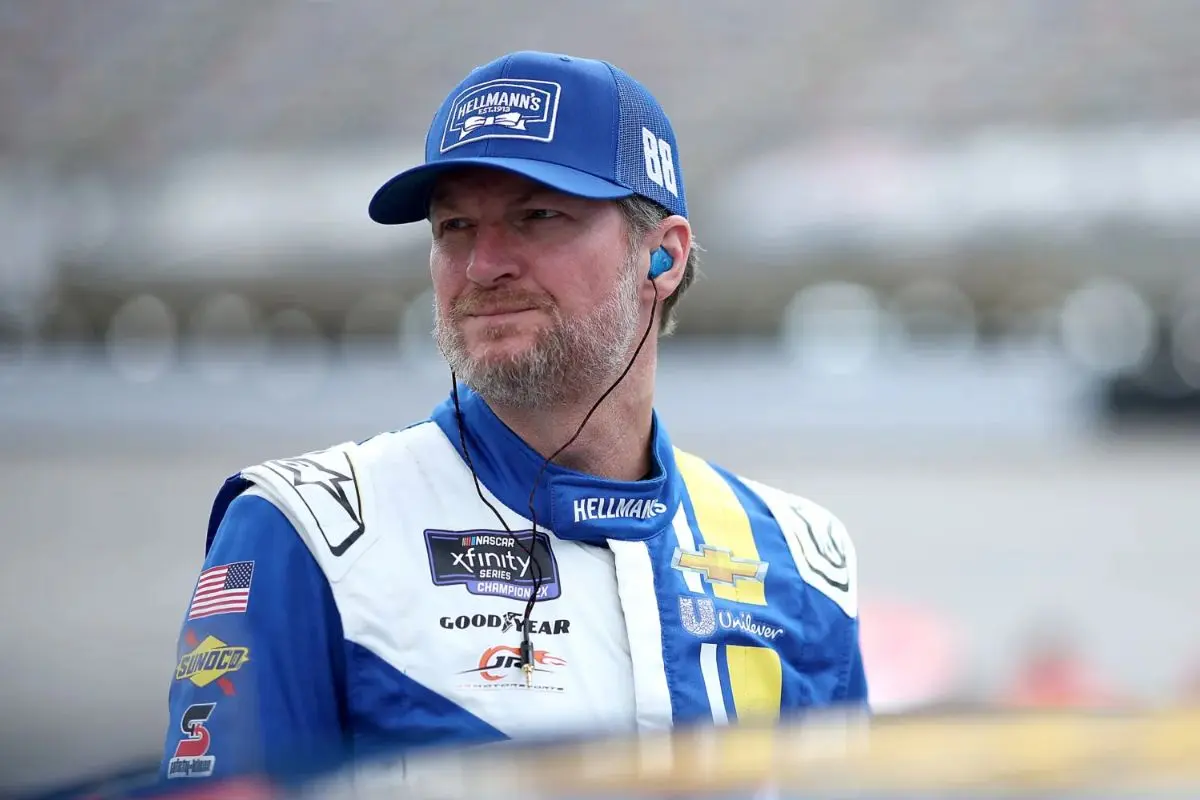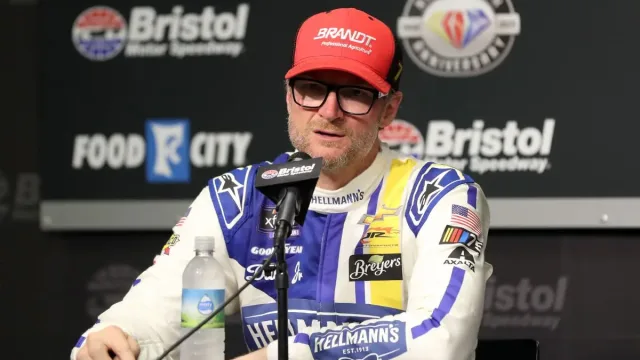Dale Earnhardt Jr. faces serious criticism and accusations as a heated social media battle unfolds, casting doubt on his influence in short-track racing. Despite his investments to improve tracks and support rising stars, some fans and critics have questioned his intentions. As the controversy deepens, Matt Weaver, a respected journalist, finds himself at the center, defending his integrity against accusations of bias. What’s really behind this feud?
Key Highlights
- Dale Earnhardt Jr. faces skepticism about his CARS Tour’s impact on short-track racing, despite investments and support for emerging talent.
- Criticisms arose over Matt Weaver’s alleged biased reporting on Kyle Larson’s Chili Bowl victory due to Earnhardt Jr.’s influence.
- Weaver has dismissed allegations of bias, emphasizing his journalistic integrity and limited professional interactions with Earnhardt Jr.
- Accusations against Weaver include financial motives, which he denies, highlighting personal financial losses in grassroots racing journalism.
- Social media amplifies disputes, impacting public perception of Earnhardt Jr. and Weaver, requiring careful management of their online reputations.
Dale Earnhardt Jr.’s Involvement in CARS Tour and Short-Track Racing
Dale Earnhardt Jr. has taken proactive steps in shaping the future of short-track racing through his involvement with the CARS Tour. His commitment to this racing series highlights a broader ambition to nurture emerging talent within the motorsport community. As a co-owner and manager of the CARS Tour, Earnhardt Jr. is instrumental in providing a competitive platform designed to serve as a launchpad for aspiring drivers aiming to make their mark in the racing world.
This initiative aligns with his ongoing efforts to revitalize and sustain the short-track racing scene, an area of motorsport that has historically been overshadowed by larger circuits.
Earnhardt Jr.’s passion for short-track racing is further evidenced by his notable contributions to the renovation of iconic venues such as the North-Wilkesboro Speedway. His efforts in these renovations not only preserve but also improve the heritage and future potential of these tracks, ensuring their continued relevance in the racing community.
By investing in infrastructure and facilitating opportunities for up-and-coming drivers, Earnhardt Jr. demonstrates a calculated vision for the future of the sport.
Despite his successes, Earnhardt Jr.’s ambitions have not been immune to criticism. Skeptics have raised concerns regarding his involvement with the CARS Tour, questioning the series’ ability to achieve its intended impact.
However, his dedication to fostering a vibrant, competitive environment for young racers remains steadfast. His actions reflect a deep-seated commitment to the sport, emphasizing his intention to leave a lasting legacy that transcends his achievements on the racetrack.

Social Media Controversy Over Matt Weaver’s Coverage
Amid the vibrant and often contentious world of motorsport journalism, a recent social media controversy has unfolded surrounding Matt Weaver’s coverage of Kyle Larson‘s tertiary Chili Bowl Nationals victory. The discord originated from a fan, an ardent admirer of Larson, who accused Weaver of biased reporting, particularly in relation to two caution flags during the race.
This critique quickly escalated, as the fan alleged that Weaver’s supposed partiality was influenced by his connection to Dale Earnhardt Jr., a prominent figure in the racing world with financial stakes in asphalt racing through his ownership of the CARS Tour.
The fan’s accusations suggested a conflict of interest, claiming that Earnhardt Jr. had orchestrated attempts to undermine dirt racing, potentially to favor his investments in asphalt racing. Such assertions imply a considerable level of influence by Earnhardt Jr. over Weaver’s journalism, a proposition that carries serious implications for journalistic integrity and the perceived impartiality of motorsport coverage.
“He’s paid by Dale Jr to cover a competing asphalt series (cars tour, which dale jr owns). This is clearly a conflict of interest for @FloRacing and @cbnationals. Secondly, Dale Jr has a fiduciary interest in the downfall of dirt racing and the success of asphalt racing. Another conflict of interest.”
The Chili Bowl needs to refuse entry to the uninitiated, fake twitter “journalist” Matt Weaver.
First of all, he’s paid by Dale Jr to cover a competing asphalt series (cars tour, which dale jr owns). This is clearly a conflict of interest for @FloRacing and @cbnationals.… pic.twitter.com/54GCeC6oGJ
— Jason Mcallister (@jason_in_texas_) January 19, 2025
This situation highlights the delicate balance journalists must maintain in covering sports where personal relationships and financial interests can intersect. Weaver, a respected figure in the motorsport journalism community, has not publicly commented on these specific accusations, leaving space for speculation and debate within the fan community.
Misconceptions About Dale Earnhardt Jr. and Matt Weaver
Despite the swirling controversy, it’s crucial to address the fundamental misconceptions regarding Dale Earnhardt Jr. and Matt Weaver‘s roles in the motorsport community. A considerable misunderstanding among fans has led to criticism of Earnhardt Jr., overshadowing his genuine commitment to the improvement of dirt racing.
His advocacy for a NASCAR Cup Series race at Eldora Speedway in 2018 demonstrates his dedication, yet some fans erroneously believe he harbors hidden agendas in short-track racing. Likewise, Matt Weaver’s journalistic integrity has been questioned, with unfounded claims that his reporting aims to undermine the Chili Bowl Nationals.
To unravel these misconceptions, let’s consider the following key points:
- Earnhardt Jr.’s Advocacy: His lobbying for dirt track races represents a sincere effort to diversify NASCAR events, reflecting his passion for the sport.
- Historical Support: Earnhardt Jr.’s engagement with dirt racing is not a recent development; it has deep roots, contradicting accusations of ulterior motives.
- Weaver’s Reporting: As a respected journalist, Weaver maintains a commitment to impartiality, aiming to present facts rather than sway public opinion.
- Misinformation Impact: The spread of inaccuracies can greatly distort public perception, emphasizing the need for fans to seek verified information.
- Community Contribution: Both Earnhardt Jr. and Weaver play crucial roles in promoting motorsport, each contributing to its growth through advocacy and informed reporting.

Matt Weaver’s Response to Criticism
Addressing the misconceptions surrounding Dale Earnhardt Jr. and Matt Weaver provides a backdrop for understanding Weaver’s response to the recent criticism he faced. As the debate sparked on social media, Weaver took a firm stance against accusations questioning his expertise and integrity. Dismissing the claims as “intellectually dishonest,” he emphasized his robust background in dirt racing, a domain where he has not only reported extensively but also actively participated as a former racer.
This personal history in the sport, Weaver argued, rendered any allegations of ignorance baseless, highlighting his credibility in racing journalism.
Further clarifying his professional connections, Weaver addressed the nature of his relationship with Dale Earnhardt Jr. Contrary to insinuations of a deeper alliance, Weaver indicated that their interactions were limited. Specifically, he noted that the only business dialogue occurred in 2022, when Earnhardt Jr. expressed interest in hosting Weaver’s media company, Short Track Scene, on his Dirty Mo Media platform.
“His coverage of this race is clearly slanted to negatively shape the Chili Bowl’s perception. Look how he begins his article, attacking the winner, downplaying his achievement, and most importantly downplaying the chili bowl format. This only further cements my first point. Lastly, he doesn’t know dirt racing, he spreads falsities that downplay the racing, and he regurgitates nonsense that fuels the false successes of corporate rookies over those who have given their all to compete in the chili bowl for years to raise its platform.” – Matt Weaver
This single encounter, Weaver highlighted, was not indicative of any ongoing or influential partnership, thereby countering claims that could suggest bias in his reporting.
Weaver’s response, crafted with precision and supported by tangible evidence, sought to dispel the erroneous assumptions that had proliferated online. By focusing on factual rebuttals and transparently addressing his professional engagements, he aimed to reinforce his standing as a credible journalist within the racing community.
Matt Weaver Defends His Financial Integrity and Coverage
Matt Weaver confronted allegations about his financial motives with transparency and candor, aiming to set the record straight regarding his integrity in racing journalism. The allegations suggested Weaver profited from biased reporting on the CARS Tour. However, Weaver made it clear that he had never been compensated by the CARS Tour and that his involvement in short-track journalism was driven by passion, not profit.
“I hate to provide oxygen to intellectually dishonest dimwits but just in case anyone buys this bulls–t.”
“I’m $10,000 in debt on STS as an investment, believing short-track journalism is important to the industry at my personal detriment. I’m lucky to get advertising support that pays dimes on my dollar. I also lose money covering dirt. I had some supporter help but lost $500 doing Chili Bowl last week. I’m not losing money the way I do just to bury something. It’s not additive to anything. Ditto my Sprint Car coverage.” Weaver then gave an apt conclusion, destroying the fan’s argument. “I’m providing you the attention you so crave but only to call you an imbecile.” – Matt Weaver
Despite financial losses, Weaver continues to invest his resources in covering the sport.
To demonstrate his commitment, Weaver shared specific financial details:
- He invested $10,000 in Short Track Scene, emphasizing his dedication to grassroots racing.
- He experienced financial loss covering dirt racing events, showcasing his non-profit-driven motives.
- His attendance at the Chili Bowl Nationals resulted in a $500 loss, reflecting his personal financial sacrifice.
- Weaver emphasized that his reporting remains unbiased and honest, regardless of financial outcomes.
- He expressed frustration over the accusations, labeling them as misguided and unfounded.
In a direct response to his accusers, Weaver did not shy away from expressing his indignation, referring to one particular critic as an “imbecile.”

News in Brief: Dale Earnhardt Jr. Faces Serious Criticism and Accusations
The controversy surrounding Dale Earnhardt Jr.’s involvement in the CARS Tour and short-track racing, compounded by the social media dispute regarding Matt Weaver’s coverage, emphasizes the complexity of public perception and media integrity. Misunderstandings between Earnhardt Jr. and Weaver have fueled the debate, prompting Weaver’s defense of his journalistic practices and financial ethics.
This situation showcases the challenges faced by public figures and journalists in maintaining transparency and credibility in an era dominated by rapid information dissemination and online scrutiny.
ALSO READ: Dale Earnhardt Jr. Breaks Silence on TikTok Ban and Its Effect on NASCAR’s Young Fans
